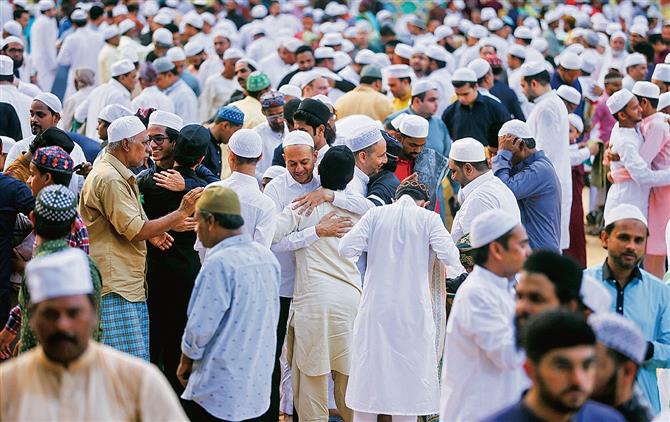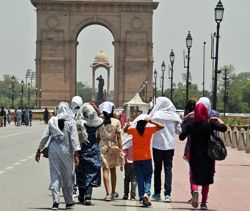
Impact of SC rulings: Till date, Parliament has enacted only two brief laws for the Muslims. Reuters
Tahir Mahmood
Former Chairman, National Minorities Commission, and Ex-member, Law Commission
WHEN the British began their rule in India, family law was part and parcel of religion in both countries — enshrined in the Canon Law of Britain and each community’s sacred books in India. The foreign rulers declared that family disputes of Hindus and Muslims would be decided by the courts as per their respective religious laws. Later, in the 19th century, they ruled that either of these laws would be applied by the courts, ‘except in so far as it has been altered or abolished by the legislative enactment’. Soon, they exercised this power by enacting general laws, overriding contrary principles of all religious laws and also by amending chosen provisions of the latter. The first two Acts so enacted were the Caste Disabilities Removal Act, 1850 (applicable to all), and the Hindu Widows’ Remarriage Act, 1856. This gave rise to a hybrid system of family law consisting of religious laws of various communities (later called personal laws) and general family laws applicable to all.
Prevailing at the time of Independence, this system was covered by Article 372 of the Constitution, declaring that all laws of the time would remain in force ‘until altered or repealed or amended by a competent legislature or other competent authority’. The Constitution thus did not protect personal law of any community for all times to come. On the contrary, it placed within the legislative jurisdiction of the state ‘all matters in respect of which parties in judicial proceedings were immediately before the commencement of this Constitution subject to their personal law’.
Article 25 of the Constitution, relating to the right to freedom of religion, declared that this freedom would not prevent the state from making laws for ‘regulating or restricting any economic, financial, political or other secular activity associated with religious practice’ or for the purpose of ‘social welfare and reform’. The Supreme Court later ruled that only those religious practices considered essential or integral to a particular religion were entitled to protection under Article 25.
After the enforcement of the Constitution, the historical duality in the domain of family law was, however, maintained. The first two family law Acts of independent India were the Special Marriage Act, 1954 (civil marriage law meant for all communities) and the Hindu Marriage Act, 1955. As regards the Muslims, the government of the day was more concerned about the management of waqfs (religious endowments). During these two years, it put on the statute book a general Waqf Act and a special Act for the Ajmer Dargah. The Hindu Marriage Act of 1955 was quickly followed by three Acts of a similar nature, covering minority, guardianship, adoption, maintenance and succession. No such law was ever enacted for the Muslims. The rulers endlessly kept waiting for an ‘initiative to come from the community’ — with the ‘community’ being equated with religious circles, to the exclusion of saner voices coming from enlightened sections.
The traditional Muslim law in force in India is at great variance with its amended versions now applicable in most of the Muslim-dominated countries of West Asia, North Africa, South Asia and Southeast Asia. The major reform areas there have been polygamy, unilateral divorce by men, and women’s divorce and post-divorce rights. An eminent judge of his time, the late Mohammad Hidayatullah, while editing DF Mulla’s popular book on Muslim law in 1966, added his own introduction to the book, ending with these optimistic words: “If the injunctions of the Quran and Hadith are not lost sight of, it is possible to make changes by legislation in a widening area. The lead is coming from Muslim countries and it is hoped that in the course of time, the same measures will be introduced in India also.” His pious hope, however, remained unfulfilled. Till date, Parliament has enacted for the Muslims only two brief laws, both in the wake of the apex court’s significant rulings: the Muslim Women (Protection of Rights on Divorce) Act, 1986, was enacted on the vehement demand of religious leaders to supersede the Shah Bano (1985) case ruling; and the Muslim Women (Protection of Rights on Marriage) Act, 2019, to give effect to the Shayara Bano (2017) case verdict. Happily, the anti-Shah Bano legislation was read down by the court 16 years later to revive that highly sensible judgment (Danial Latifi, 2001).
In the Sarla Mudgal case of 1995, while one judge on the Bench had passionately pleaded for a uniform civil code, the other had advised the rulers to entrust the issue of minorities’ personal law reform jointly to the Law Commission and the National Minorities Commission. The sensible advice was, however, never accepted. No issue of Muslim law has ever been referred to either of these bodies. The All India Muslim Personal Law Board was set up in 1973 with the declared object of protecting traditional understanding of the Muslim law. In 1985, then Minorities Commission Chairman and former Chief Justice of India late Justice Hameedullah Beg had written to the government, “We have to try to lead religious leaders out of darkness into light and not allow them to lead us into darkness.” His thought-provoking words, however, fell on deaf years. Twenty-five years later, a report written by me as a member of the 18th Law Commission, proposing an overhaul of the outdated Muslim Personal Law (Shariat) Application Act, 1937, was turned down by its Chairman, former Supreme Court judge late AR Lakshmanan, for fear of a ‘backlash’.
While the traditional Muslim law was protected by successive governments as a matter of policy, archaic laws and customs prevailing in Goa, Daman and Diu remain protected by parliamentary legislation — and in Nagaland and Mizoram by constitutional provisions. The adoption of a uniform civil code in terms of the Constitution requires drastic changes, not only in the official policy regarding Muslim law, but also in constitutional provisions and legislation running contrary to the ideal of such a code.
Join Whatsapp Channel of The Tribune for latest updates.




























